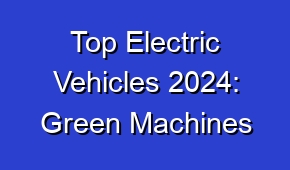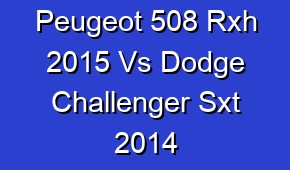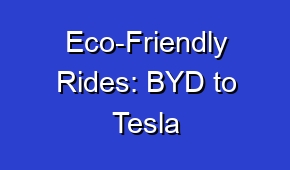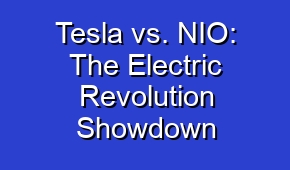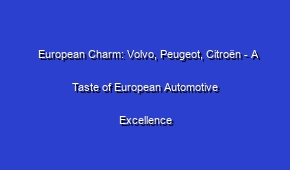Volkswagen’s Journey: Beetle to ID.4 Evolution

Discover Volkswagen’s remarkable journey from the iconic Beetle to the cutting-edge ID.4 electric vehicle. Witness the evolution of automotive innovation and sustainability as Volkswagen paves the way for a greener future.
Volkswagen’s journey from the iconic Beetle to the cutting-edge ID.4 has been nothing short of remarkable. With a rich history spanning decades, Volkswagen has evolved and adapted to the changing automotive landscape, always staying ahead of the curve. The Beetle, known for its distinctive design and cult following, captured hearts around the world. However, as environmental concerns grew, Volkswagen recognized the need for more sustainable transportation solutions. Enter the ID.4, an all-electric SUV that combines the brand’s legacy of innovation with a greener future. The ID.4 represents a shift towards emission-free driving, offering impressive range and advanced technology. This forward-thinking approach aligns with Volkswagen’s commitment to reducing carbon emissions and embracing electric mobility. As Volkswagen continues its journey from the Beetle to the ID.4, it demonstrates its dedication to shaping the future of transportation.
| Volkswagen’s journey: from Beetle to ID.4 showcases the brand’s evolution and innovation. |
| The iconic Volkswagen Beetle played a significant role in the company’s history. |
| Volkswagen’s transition to electric vehicles is exemplified by the cutting-edge ID.4. |
| The Beetle, known for its distinctive design, holds a special place in Volkswagen’s legacy. |
| The ID.4 represents Volkswagen’s commitment to sustainable and eco-friendly mobility. |
- The Beetle, introduced in 1938, became one of the most recognizable cars in history.
- Volkswagen’s decision to discontinue the Beetle marked a turning point for the company.
- The ID.4 is an all-electric SUV that combines performance, style, and advanced technology.
- Volkswagen aims to make electric vehicles more accessible with the ID.4’s competitive pricing.
- The ID.4 offers impressive range, fast charging capabilities, and a spacious interior.
What is the history of Volkswagen’s journey from Beetle to ID.4?
Volkswagen has a rich history that spans decades, and its journey from the iconic Beetle to the modern ID.4 electric vehicle is a testament to its evolution. The Beetle, also known as the “People’s Car,” was first introduced in the 1930s and gained popularity worldwide for its affordable price and distinctive design. Over the years, Volkswagen expanded its lineup with various models, including the Golf, Passat, and Jetta.
| Beetle | Electric Transformation | ID.4 |
| The iconic Volkswagen Beetle was introduced in 1938. | In recent years, Volkswagen started focusing on electric mobility. | The ID.4 is Volkswagen’s first fully electric SUV. |
| It became one of the most popular cars in history, with over 21 million units sold. | Volkswagen developed the Modular Electric Drive Matrix (MEB) platform for its electric vehicles. | The ID.4 combines sustainability, spaciousness, and cutting-edge technology. |
| Production of the Beetle continued until 2003. | Volkswagen’s electric transformation aims to reduce emissions and provide eco-friendly transportation. | The ID.4 offers a long electric range and fast charging capabilities. |
As the automotive industry shifted towards sustainability and electric mobility, Volkswagen embarked on a new chapter with its ID. series. The ID.4 is an all-electric SUV that represents Volkswagen’s commitment to a greener future. It features a sleek design, advanced technology, and impressive range, making it a compelling choice for eco-conscious drivers.
What are the key features of Volkswagen’s ID.4?
The Volkswagen ID.4 comes with several key features that set it apart in the electric vehicle market. Firstly, it offers a spacious interior with ample cargo space, making it practical for everyday use and long journeys. The ID.4 also boasts a long electric range, allowing drivers to travel without frequent charging stops.
- Electric powertrain: The ID.4 is an all-electric SUV, powered by a 82 kWh battery pack and an electric motor that produces 201 horsepower. It offers a range of up to 250 miles on a single charge, making it suitable for long-distance travel.
- Spacious interior: The ID.4 features a roomy cabin with seating for five passengers. It offers 30.3 cubic feet of cargo space, which can be expanded to 64.2 cubic feet by folding down the rear seats. The interior is designed to be comfortable and ergonomic, with premium materials and advanced technology.
- Advanced technology: The ID.4 comes with a range of cutting-edge features, including a 10-inch touchscreen infotainment system, wireless smartphone integration, and voice control. It also offers advanced driver-assistance systems, such as adaptive cruise control, lane-keeping assist, and automatic emergency braking.
In terms of performance, the ID.4 delivers instant torque and smooth acceleration thanks to its electric motor. It offers a comfortable ride with precise handling and responsive steering. Additionally, the ID.4 incorporates advanced technology features such as a digital cockpit, intuitive infotainment system, and a variety of driver-assistance systems for enhanced safety.
How does the Volkswagen ID.4 contribute to sustainability?
The Volkswagen ID.4 plays a significant role in Volkswagen’s commitment to sustainability and reducing carbon emissions. As an all-electric vehicle, it produces zero tailpipe emissions, helping to improve air quality and reduce the environmental impact of transportation.
- The Volkswagen ID.4 is an all-electric SUV, which means it produces zero emissions during operation.
- It is powered by a high-capacity battery that can be charged using renewable energy sources such as solar or wind power, further reducing its carbon footprint.
- The ID.4 is designed with sustainability in mind, using eco-friendly materials in its construction, such as recycled plastics and natural fibers.
- By offering an electric alternative to traditional gasoline-powered vehicles, the ID.4 helps reduce dependence on fossil fuels and promotes a more sustainable transportation system.
- Additionally, the ID.4’s energy-efficient design and regenerative braking system help maximize its range and minimize energy consumption, making it a more sustainable choice for daily commuting and longer trips.
Furthermore, the ID.4 is manufactured using sustainable practices and materials. Volkswagen aims to minimize its ecological footprint by implementing eco-friendly production processes and utilizing renewable energy sources in its manufacturing facilities.
What is the charging infrastructure for the Volkswagen ID.4?
The Volkswagen ID.4 benefits from a growing network of charging infrastructure to support its electric mobility. Owners can charge their ID.4 at home using a standard power outlet or opt for a dedicated wallbox charger for faster charging times.
| Charging Port | Charging Speed | Charging Options |
| Type 2 (AC), CCS (DC) | Up to 125 kW (DC) | – Home Charging: Using a standard household outlet or a dedicated home charger.- Public Charging: Utilizing public charging stations with Type 2 or CCS connectors.- Fast Charging: Accessing high-power DC fast charging stations for quicker charging. |
Additionally, Volkswagen is collaborating with various charging providers to expand public charging stations across different regions. This allows ID.4 owners to conveniently charge their vehicles during longer trips or when away from home. The availability of fast-charging stations further reduces charging times, enabling efficient and convenient long-distance travel.
What are the advantages of owning a Volkswagen ID.4?
Owning a Volkswagen ID.4 comes with several advantages, especially for those looking to transition to electric mobility. Firstly, the ID.4 offers significant cost savings in terms of fuel expenses, as electricity is generally cheaper than gasoline or diesel.
Owning a Volkswagen ID.4 comes with advantages such as zero emissions, spacious interior, advanced technology, and impressive driving range.
Additionally, maintenance costs for electric vehicles tend to be lower compared to traditional internal combustion engine vehicles. Electric motors have fewer moving parts and require less frequent servicing, resulting in potential long-term savings.
Is the Volkswagen ID.4 eligible for government incentives?
Many countries and regions provide government incentives to promote the adoption of electric vehicles, and the Volkswagen ID.4 may be eligible for such incentives. These incentives can include tax credits, rebates, or grants that help reduce the purchase price of the vehicle.
The eligibility of the Volkswagen ID.4 for government incentives varies depending on the country and specific incentive programs.
It is advisable to check with local authorities or consult Volkswagen’s official website to determine the specific incentives available in your area and whether the ID.4 qualifies for them.
What is the future of Volkswagen’s electric vehicle lineup?
Volkswagen has made a strong commitment to electric mobility and plans to expand its electric vehicle lineup in the coming years. The ID.4 is just the beginning of Volkswagen’s electric revolution, with more models set to be introduced under the ID. series.
1. Expansion of Electric Vehicle Models
Volkswagen plans to expand its electric vehicle lineup in the future by introducing new models. This includes the launch of the highly anticipated ID.4 electric SUV, which is expected to be a major competitor in the market. Additionally, Volkswagen has announced plans to release more electric models in various segments, such as electric sedans and compact cars. This expansion aims to cater to a wider range of customer preferences and increase the brand’s presence in the electric vehicle market.
2. Advancements in Battery Technology
As part of its commitment to electric mobility, Volkswagen is continuously working on advancements in battery technology. The company aims to improve the range, charging times, and overall performance of its electric vehicles. Volkswagen is investing in research and development to develop more efficient and high-capacity batteries that can provide longer driving ranges. These advancements in battery technology will play a crucial role in shaping the future of Volkswagen’s electric vehicle lineup.
3. Integration of Autonomous Driving Features
In addition to electric powertrains, Volkswagen is also focusing on integrating autonomous driving features into its electric vehicles. The company aims to develop advanced driver-assistance systems and eventually achieve full autonomy in the future. These autonomous driving features will enhance the overall driving experience, improve safety, and offer convenience to Volkswagen electric vehicle owners. By combining electric mobility with autonomous capabilities, Volkswagen aims to stay at the forefront of automotive innovation.
The company aims to offer a range of electric vehicles that cater to different segments and customer preferences. This includes compact cars, sedans, SUVs, and even electric vans. Volkswagen’s goal is to make electric mobility accessible to a wider audience and contribute to a sustainable future for transportation.


